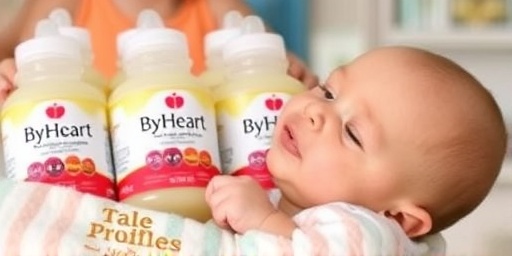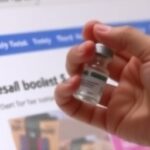Parents Allege Early Illnesses Tied to ByHeart formula Consumption
In a disturbing development that’s raising alarms in public health circles, multiple parents have come forward claiming their infants fell seriously ill after consuming ByHeart formula as early as six months before the official recognition of an infant botulism outbreak. These reports, first surfacing on social media and parent forums, describe symptoms including lethargy, poor feeding, and constipation in newborns, which mirror the hallmarks of infant botulism. The revelations have intensified scrutiny on the ByHeart formula, a popular whole-milk-based infant nutrition product marketed as a premium alternative to traditional formulas.
- Parents Allege Early Illnesses Tied to ByHeart formula Consumption
- CDC Expands Probe into ByHeart Formula’s Role in Botulism Surge
- ByHeart Formula Faces Intense Scrutiny Over Manufacturing Practices
- Unpacking the Science: How Infant Botulism Emerges from Formula Risks
- Broader Public Health Implications and Steps for Concerned Parents
One mother from Texas, Sarah Jenkins, shared her ordeal in a viral post on a parenting subreddit. “My six-week-old son started refusing bottles and became unusually floppy just days after we switched to ByHeart. Doctors initially dismissed it as colic, but it was botulism,” Jenkins recounted. Her baby required hospitalization and antitoxin treatment, a grueling experience that left the family traumatized. Similar stories have emerged from California and New York, with at least a dozen parents corroborating timelines that predate the CDC’s recent outbreak declaration by several months.
These anecdotal accounts are gaining traction amid a surge in confirmed infant botulism cases linked to the product. The CDC, the nation’s leading public health authority, has now acknowledged the potential for an expanded outbreak timeline, urging parents nationwide to monitor their infants closely. As reports accumulate, questions swirl about how early warning signs were overlooked, potentially endangering thousands of vulnerable babies who rely on formula for nutrition.
CDC Expands Probe into ByHeart Formula’s Role in Botulism Surge
The Centers for Disease Control and Prevention (CDC) has escalated its investigation into the ByHeart formula following parent testimonies that push the outbreak’s origins back to late 2023. Previously, the agency had pinpointed a cluster of 15 confirmed infant botulism cases in early 2024, all involving infants under six months who had ingested the formula. Now, with retrospective reports, the CDC is re-evaluating data from hospital records and formula batch distributions dating back to September 2023.
“We’re taking these parent reports very seriously and are working to trace the full scope of this outbreak,” said Dr. Elena Ramirez, a CDC epidemiologist specializing in foodborne illnesses, in a statement released yesterday. The investigation involves collaboration with the Food and Drug Administration (FDA), which oversees formula safety, and includes laboratory testing of retained ByHeart samples from affected households. Preliminary findings suggest possible contamination with Clostridium botulinum spores, the bacteria responsible for botulism, though the exact source—whether manufacturing, packaging, or distribution—remains unclear.
Public health experts emphasize that infant botulism is rare but devastating, occurring when bacterial spores colonize an infant’s immature gut and produce a neurotoxin that causes muscle paralysis. The CDC estimates that only about 100-150 cases occur annually in the U.S., making this potential outbreak—a cluster potentially exceeding 25 cases—a significant anomaly. To bolster the probe, the CDC has launched a national reporting hotline for parents suspecting formula-related illnesses, already fielding over 50 calls in the past week.
ByHeart Formula Faces Intense Scrutiny Over Manufacturing Practices
ByHeart, a New York-based startup founded in 2016, has positioned itself as a disruptor in the $50 billion infant formula market by using organic, grass-fed whole milk instead of corn syrup solids found in many competitors. The company’s formula, available in both powder and ready-to-feed formats, underwent rigorous FDA pre-market review and has been praised for its nutritional profile. However, the current crisis has cast a shadow over its operations, with parents and regulators demanding transparency on quality controls.
In response to the mounting concerns, ByHeart issued a statement late last night: “The safety of babies is our top priority. We are fully cooperating with the CDC and FDA and have voluntarily recalled select batches produced between August and December 2023 as a precautionary measure.” The recall affects products with specific lot numbers, distributed primarily through online retailers and major chains like Target and Amazon. Despite the swift action, critics argue that ByHeart’s rapid growth—fueled by $135 million in venture funding—may have strained its supply chain, potentially leading to lapses in sterility protocols.
Industry insiders point to the inherent risks in powdered infant formula production. Unlike liquid formulas, powders are not commercially sterile and can harbor bacterial spores if not processed under exacting conditions. A 2022 FDA advisory had already warned about botulism risks in formulas, recommending boiling water for reconstitution to kill potential contaminants. ByHeart’s marketing, which highlights its “hospital-grade” safety, is now under fire, with lawsuits from affected families already in the works seeking damages for medical costs and emotional distress.
Unpacking the Science: How Infant Botulism Emerges from Formula Risks
Infant botulism, the most common form of botulism in the U.S., strikes babies typically between two weeks and six months old when their digestive systems are not yet equipped to handle certain bacteria. The culprit, Clostridium botulinum, thrives in low-oxygen environments like improperly sealed cans or, in rare cases, formula powders exposed to contaminants. Once ingested, the spores germinate in the gut, releasing a toxin that blocks nerve signals, leading to symptoms like weak cry, droopy eyelids, and respiratory failure if untreated.
According to the CDC, the incubation period for infant botulism can range from 3 to 30 days, which aligns with parents’ reports of illnesses emerging shortly after starting ByHeart formula. Dr. Marcus Hale, a pediatric infectious disease specialist at Johns Hopkins Children’s Center, explained in an interview: “Honey is the well-known no-go for infants due to botulism spores, but formula isn’t immune. If manufacturing introduces even trace amounts, it can be catastrophic for newborns.” Hale noted that while adult botulism often stems from food poisoning, the infant variant is uniquely tied to gut colonization, making early detection critical.
Statistics underscore the urgency: The mortality rate for untreated infant botulism hovers around 5-10%, but with prompt antitoxin administration—like BabyBIG, a human-derived botulism immune globulin—outcomes improve dramatically. In this outbreak, at least three infants have required mechanical ventilation, highlighting the stakes. Public health campaigns are ramping up to educate on safe formula preparation, including using water heated to at least 158°F (70°C) and avoiding homemade dilutions.
Broader Public Health Implications and Steps for Concerned Parents
As the CDC’s investigation unfolds, the ByHeart formula outbreak is prompting a reevaluation of infant nutrition safety standards across the industry. Public health officials worry that underreported cases could mean the true scope is far wider, especially given ByHeart’s distribution to over 100,000 families monthly. The incident echoes past crises, like the 2022 Abbott Nutrition recall that led to nationwide shortages, underscoring vulnerabilities in the U.S. formula supply chain exacerbated by consolidation among a few major players.
For parents navigating this uncertainty, experts offer clear guidance. The American Academy of Pediatrics recommends switching to pasteurized, commercially prepared formulas from unaffected brands if concerns arise, and consulting pediatricians immediately for any signs of botulism. Breastfeeding remains the gold standard for protection, as human milk contains antibodies that inhibit bacterial growth. Support groups are forming online, providing resources for affected families, while advocacy organizations like the Infant Risk Center are pushing for mandatory spore testing in all powdered formulas.
Looking ahead, the CDC plans to release interim findings within two weeks, potentially leading to enhanced FDA regulations on infant formula production. ByHeart has pledged to invest in upgraded facilities, but trust will be hard-won. In the meantime, public health vigilance is paramount: This outbreak serves as a stark reminder that even innovative products must prioritize unyielding safety to protect the most fragile among us. Parents are advised to check lot numbers on their ByHeart formula via the company’s website and report any symptoms to local health departments, contributing to a collective effort to contain the crisis.
The ripple effects extend to global markets, where ByHeart exports are now halted pending clearance. Economists predict short-term disruptions in formula availability, but long-term, this could spur innovation in safer, spore-resistant formulations. As investigations deepen, the focus remains on prevention: Ensuring every bottle safeguards the promise of healthy beginnings for America’s infants.








